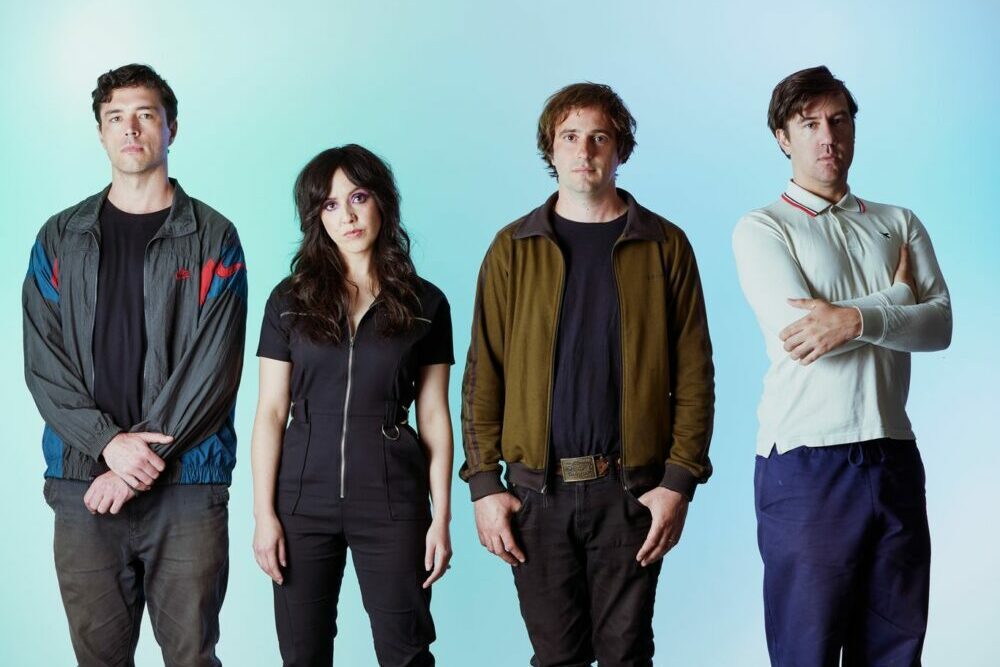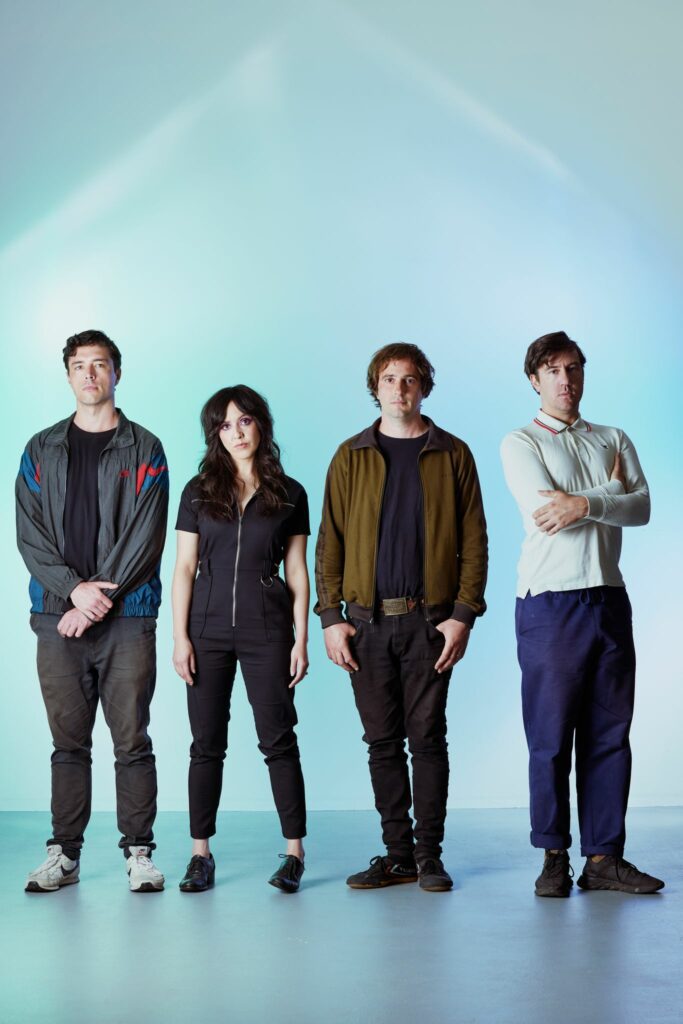Screensaver Pay Homage to Classic Post-Punk with Debut LP Expressions of Interest


Discovering screensaver’s debut album Expressions of Interest (released October 8 through Heavy Machinery Records) might make you wonder if you’ve stumbled upon a B-sides and rarities album from the late 1980s. Somewhere between Siouxsie And The Banshees and Visage, the lush synths and dramatic dance punk guitars suggest more than a passing passion for the indie-New Romantic era that spawned Cocteau Twins, Echo & The Bunnymen and My Bloody Valentine, too.
The Melbourne four-piece began as a bedroom project between Krystal Maynard and her husband Christopher Stephenson back in late 2015, when Perth-born Maynard was living in Melbourne and Stephenson was still in his hometown of Austin, Texas. The two had met in Berlin in 2014 when both were on the same bill in their respective bands.
“For about two years we were living in separate countries, but we had screensaver – though it wasn’t named at that point – as a project between us, [with material] that we’d send back and forth and collaborate that way,” explains Maynard. “We did that for a long time, very low-key, starting in late 2015, with no intention of it becoming anything other than a way for us to be creative while living in different countries.”
When Stephenson moved to Melbourne in 2017, he was familiar with the city from having toured there in the past. Though he initially took some time to adjust, both Maynard and Stephenson are “lifers” when it comes to music, and it wasn’t long before he’d joined two Melbourne bands. He currently drums for Exek and Spiritual Mafia, while continuing to collaborate remotely with Spray Paint (with members in upstate New York and Austin, respectively).
After putting a couple of demos on Bandcamp, screensaver began to get asked by friends if they would play shows, though “we actively wanted to avoid playing live, because we’d played in a lot of live, active bands,” says Maynard. “We were nervous about it because things become so busy and we both had multiple projects. I had two other bands on the go back in 2017, so we wanted to keep it as a bedroom project where we focused on writing.”
Realising that as a duo they’d either need a sequencer if they were to play live, or a band, Maynard and Stephenson set out to find additional members. First came Giles Fleike (Low Tide), who had been in a band with Stephenson called Orange (“I doubt anyone’s heard of them, they only played a few gigs,” admits Maynard).
“He’s a friend of ours, so we asked if he’d be interested in coming in to play bass… he’s also an amazing keyboardist and knows a lot about synthesisers and noise, so he brought a lot of different sounds to the band,” she says.
In keeping with their ethos of working with friends and criss-crossing personal and professional divides without fear, it was only natural to invite James Beck (of Personal Touch and Rat Columns) to round out their band.
“[James is] very, very old friend of mine, since I was five and he was three. We were neighbours,” she says. “He does a lot of electronic producing, so I thought he’d gone solely into producing electronic music, but when I sent him the demos… he liked the demos a lot, so he decided he would play live drums again. I joke that I pulled him out of retirement and back onto the kit.”
Those demos felt to Maynard as if she’d come full circle to the music she’d developed a passion for as a club-going teenager in Perth. At a club called Dominion (as dark and gothic as the name suggests, she confirms), she first heard goth and industrial bands like Skinny Puppy, The Cure, Joy Division and Bauhaus. She later got into Gang of Four and Wire, Magazine, and Modern Lovers, and the world of art punk. All these influences are reflected in their new album.
An admitted goth teenager, obsessed with The Cure, Siouxsie And The Banshees, and Joy Division, Maynard’s influences are worn on her sleeve. “They’re a core part of my formative taste, so it felt very natural to be playing in a band that is influenced by post punk from that first wave British era, New Wave and electronica, all of that,” she says.
The Cocteau Twins’ “Heaven Or Las Vegas,” with its luscious swirl of synths and echoing guitars, could have planted the creative seed of “Soft Landing,” while “No Movement” feels like a B-side to The Cure’s “Killing An Arab.” Elsewhere, “Buy Sell Trade” drives a serrated-edge synth saw through the sonic darkness in a Gary Numan-meets-Bladerunner shock of pure adrenalin.
Maynard started playing in a band when she was 15. Since she was under age, she often snuck into venues to play with her older bandmates. But even earlier, it was her father’s prolific record collection that opened her eyes to the possibility of a life in music. She’d comb the records looking for women artists, and it was seeing Patti Smith, Janis Joplin, then Poly Styrene of X-Ray Spex, who kickstarted her passion for finding “anyone who wasn’t a white male playing in a band.”
When she met her first bandmates, they were into L7, Babes In Toyland, and Bikini Kill. Having invited Maynard into their band, where she “smashed out 3-chord riffs,” they gave her time and support to learn how to play guitar. It was their generosity and the riot grrl ethos of “girls to the front” that remains central to how she lives her life.
“I’m 100% a feminist. I don’t understand anyone who isn’t these days. We have to be and we have to continue to be,” she says. “If you don’t see representations of yourself, or somebody like you, doing things, then you won’t go out there and do it yourself.”
Screensaver intended to make an album in 2020, and they’d begun the recording process just prior to lockdown. Once the pandemic effectively closed the city, Beck set to work programming the drum parts, while Stephenson and Maynard wrote their parts over his beats.
“We have songs that we write, like ‘No Movement,’ which we created in a jam room. But when you sit at home and nobody is waiting for you to come up with a bass riff, you can come up with music that’s really considered,” Maynard says. “So, half our album is written pre-lockdown in a jam room while the other half is written ‘in the box,’ where someone has written a foundational synth part or drums, then we’ve built it up that way. It’s meant that we have an album that’s well-rounded, not just ten straight-up, post-punk songs. They have a different energy to them.”
She put the demo for “Skin” together in 2019, the first time she’d demoed a song with the foundational drums and synths, which she sent to the band. “I’d been teaching myself to program drums, and I’d programmed a song with all the drums done. For me, being able to demo a song like that and having done it all in GarageBand was exciting for me,” Maynard remembers. “Chris was overseas when I put the demo together, so he was listening to it in another country. He’s an engineer and he’s great at producing music, but for me it’s all new and exciting. He loved it and was thinking of parts for it straight away. I feel like I was the genesis of that song.”
Another of her favourites, “Buy Sell Trade” began with an “incredible, catchy synth line” written by Stephenson that underpins the whole song. It’s a “motoric, kraut-rock jam that’s danceable but kind of psych-y… sometimes you write a riff and you go, ‘That’s a hook!’” she enthuses. Maynard is convinced she doesn’t have the music theory knowledge nor the co-ordination to intuitively play drums, so it’s been empowering to master it digitally. “I can build an interesting, eclectic drum beat that breaks the rules of timing,” she says. “It’s so fun. It opens your world. If you can build a drum beat, you can write a song.”
Follow screensaver on Instagram for ongoing updates.

